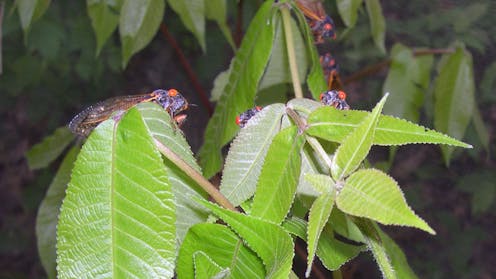Play all audios:
October 24, 2019 Stephanie Spera, _University of Richmond_ To untangle the relationship between climate change, fall foliage and national park visitors, researchers are asking tourists to
check their old photo albums for snapshots that could hold valuable data. September 12, 2019 Tony Robert Walker, _Dalhousie University_ Governments need better information on which types of
plastic generate the most pollution — citizens can help. June 26, 2019 Gordon Rugg, _Keele University_ The Voynich Manuscript has researchers, the media, and the public hooked. But
pseudo-explanations for the book’s ‘code’ reveals a serious problem with society’s relationship with science. April 24, 2019 Jade Savage, _Bishop's University_ If you are bitten by a
tick, you need to find out what species it was, fast. A research team has developed a website to help people in Quebec, Ontario and New Brunswick do just that. April 15, 2019 Richard
Schuster, _Carleton University_; Amanda D. Rodewald, _Cornell University_; Joseph Bennett, _Carleton University_; Peter Arcese, _University of British Columbia_, and Scott Wilson, _Carleton
University_ A collection of millions of bird sightings has identified the best places to invest in conservation. April 11, 2019 Colin Ferster, _University of Victoria_ and Meghan Winters,
_Simon Fraser University_ Volunteers can contribute data to maps that help cyclists choose their routes and let planners know how city cycling can be improved. April 8, 2019 Sian Green,
_Durham University_ Camera traps allow citizen scientists to peek into the hidden lives of Britain’s mammals. April 2, 2019 Kate E. Smith, _University of British Columbia_; Diane Hanano,
_University of British Columbia_, and Dominique Weis, _University of British Columbia_ Urban pollutants are a health concern in growing cities. Scientists are turning to honey bees to help
monitor contaminants in soil, water, air and plants. April 1, 2019 Hannes Baumann, _University of Connecticut_ For decades, New England students took field trips out into the Long Island
Sound. Their data show how quickly the sound is warming, leading to fewer American lobster, rock crab and winter flounder. March 27, 2019 Luther van der Mescht, _Stellenbosch University_ By
finding out more about the cat flea, researchers could maybe identify better pest control measures. March 21, 2019 Tarun Katapally, _University of Regina_ Citizens can be recruited in
addressing data deficits. March 7, 2019 Michael D. Mehta, _Thompson Rivers University_ The smoke from wood-burning stoves and fireplaces contributes to air pollution and poor health.
February 14, 2019 Claire Gwinnett, _University of Staffordshire_ Nurdles are a raw feedstock used to make most of the plastic products we use everyday, but they’re flooding the ocean as
“mermaid tears”. February 7, 2019 David Jones, _University of Portsmouth_ Volunteers from all over the world are taking part in a citizen science project to help scientists work out how bad
microplastic pollution really is. February 5, 2019 Sara Mynott, _University of Exeter_ Citizen science game offered clues to why shore crabs get greener as they grow. October 22, 2018 Katie
M. Clow, _University of Guelph_ Fall is peak activity time for adult blacklegged ticks, increasing the risk of tick bites on both people and pets. October 17, 2018 John M. Carroll, _Penn
State_ When people form local networks to take care of resources such as drinking water, they strengthen their communities. Technology can support these efforts and promote learning and
innovation. August 29, 2018 Ellen Rochelmeyer, _The Conversation_ The 2018 Australian Museum Eureka Prize winners include astrophysicist and science communicator Alan Duffy and the citizen
science app QuestaGame. July 30, 2018 Gavan Cooke, _Anglia Ruskin University_ Elusive and mysterious by nature, ordinary people are revealing the secrets of the UK’s octopuses. July 5, 2018
Saskia Beudel, _University of Canberra_ Climate change can seem far removed from our everyday lives, which is why a citizen science program measuring how frogs are dealing with a warming
world is so important.

